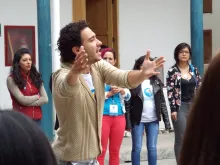Effective globally as of 31 January 2017, the many changes to the national UN Volunteer Conditions of Service include paternity cover, revised living and hardship support, the introduction of short term and university schemes and extending medical coverage, among others.
As part of a general thrust for reform and streamlining, the United Nations Volunteers (UNV) programme has updated the Conditions of Service for national UN Volunteers, effective globally as of 31 January 2017. The revised Conditions of Service are the outcome of an exhaustive review and extensive consultations with UN partners and UN Volunteers. In their reformulation, the conditions better suit the changing needs of UN Volunteers, retain UNV as an attractive partner for UN agencies, and streamline volunteer management procedures globally.
“I am very pleased that after a comprehensive process of consultation and assessment of options, UNV has revised the Conditions of Service for national UN Volunteers,” stated UNV Executive Coordinator Olivier Adam. “These changes recognize the need for greater family support as well as adequate and equitable living allowances, especially for national UN Volunteers serving in hardship and non-family duty stations.
“I believe everyone concerned will join me in welcoming these changes as essential investments that will have a positive impact on the contribution our volunteers make across the UN system,” UNV’s head concluded.
The many positive changes to the national UN Volunteer Conditions of Service include paternity cover, revised living and hardship support, streamlined resettlement and pre-departure allowances, the introduction of short term and university schemes, and extending medical coverage.
The national UN Volunteer modality was developed as an attractive opportunity for the United Nations system to support national governments and counterparts to integrate volunteerism into peace and development efforts within their own country and communities.
Since the development of this modality, development work has been shifting more strongly toward building national and local capacity. Building on that momentum, the national UN Volunteer modality continues to offer tremendous potential for UNV and the entire UN system to more effectively support peace and development, to encourage national commitment, and to strengthen national and local capacities.
The 2005 Paris Declaration on aid effectiveness emphasizes “using a country’s own institutions and systems, where these provide assurance that aid will be used for agreed purposes, [and] increases aid effectiveness by strengthening the partner country’s sustainable capacity to develop, implement and account for its policies to its citizens and parliament.”
In advancing this noble notion, the mobilization of national UN Volunteers remains core to UNV’s mandate and has constituted the bulk of the organization’s growth in a changing environment. At present national UN Volunteers account for 39% of the UN Volunteers serving in the field, with 1,643 national UN Volunteers currently carrying out assignments in 94 countries.
UNV constantly works to ensure that its strategy, programmes, and policies are adapted to changing realities, including the regular review and modernization of the service regime for UN Volunteers in all its aspects.
→ Overview of the changes to the Conditions of Service for national UN Volunteers.
→ More information on the Conditions of Service for national UN Volunteers, including full document.
For further information and interviews please contact:
Jennifer Stapper, Chief, Communications, UNV, jennifer.stapper@unv.org
Mobile: +49 15201522181
Editor's note:
The United Nations Volunteers (UNV) programme contributes to peace and development through volunteerism worldwide. We work with partners to integrate qualified, highly motivated and well supported UN Volunteers into development programming and promote the value and global recognition of volunteerism.
UNV deploys, on the ground, almost 7,000 UN Volunteers in over 130 countries. An additional 12,000 UN Online Volunteers dedicate their time and efforts virtually, proving that anyone anywhere can contribute to peace and development. UN Volunteers make a difference wherever they are active: from Haiti to South Sudan in peacekeeping; to relief efforts in Nepal and women’s empowerment in Ecuador. UN Volunteers reach 2,000 civil society organizations with additional capacity and new skills and contribute to the work of more than 30 UN entities in reaching the Sustainable Development Goals.
UNV is administered by the United Nations Development Programme (UNDP).

